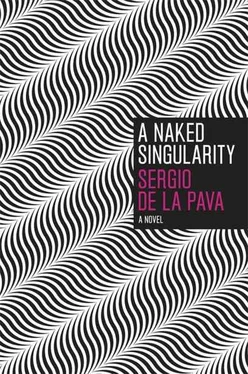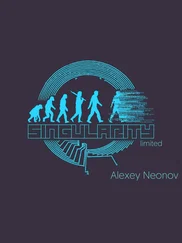Sergio De La Pava - A Naked Singularity
Здесь есть возможность читать онлайн «Sergio De La Pava - A Naked Singularity» весь текст электронной книги совершенно бесплатно (целиком полную версию без сокращений). В некоторых случаях можно слушать аудио, скачать через торрент в формате fb2 и присутствует краткое содержание. Год выпуска: 2012, Издательство: University of Chicago Press, Жанр: Современная проза, на английском языке. Описание произведения, (предисловие) а так же отзывы посетителей доступны на портале библиотеки ЛибКат.
- Название:A Naked Singularity
- Автор:
- Издательство:University of Chicago Press
- Жанр:
- Год:2012
- ISBN:нет данных
- Рейтинг книги:5 / 5. Голосов: 1
-
Избранное:Добавить в избранное
- Отзывы:
-
Ваша оценка:
- 100
- 1
- 2
- 3
- 4
- 5
A Naked Singularity: краткое содержание, описание и аннотация
Предлагаем к чтению аннотацию, описание, краткое содержание или предисловие (зависит от того, что написал сам автор книги «A Naked Singularity»). Если вы не нашли необходимую информацию о книге — напишите в комментариях, мы постараемся отыскать её.
Infinite Jest
A Naked Singularity
A Frolic of His Own
A Naked Singularity
A Naked Singularity — читать онлайн бесплатно полную книгу (весь текст) целиком
Ниже представлен текст книги, разбитый по страницам. Система сохранения места последней прочитанной страницы, позволяет с удобством читать онлайн бесплатно книгу «A Naked Singularity», без необходимости каждый раз заново искать на чём Вы остановились. Поставьте закладку, и сможете в любой момент перейти на страницу, на которой закончили чтение.
Интервал:
Закладка:
The next day I would go to work and Dane would want to know why the ignored calls et cetera. I would tell him that as far as the caper went I was out, was never truly in. I would add that he was of course free to do as he wished with no interference from me, each man being famously the agent of his own victory or defeat. I would speak those words, the whole thing would be over, and I would enjoy a peace I had not felt in weeks.
I got out of the car. It was maybe not as cold as I remembered it pre-Alabama. People were everywhere on that street too, small clouds shooting from their mouths as they milled around flat-tire repair shops and fried chicken places with bulletproof glass. And I remember how all those people looked around and laughed in unison when a sound like a record being played backwards was suddenly heard throughout followed by the sight of every light on the street suddenly dimming rapidly until reaching complete darkness. The many stores that seconds earlier had the streets surrounded and seemed so intractable now vanished. In this sudden black it was difficult to make out any object or take a certain step. Then as abruptly as the blackness had come the lights were resurrected; creeping up in intensity until they shone even brighter than before, omnipresent and ready again to illume the way.
chapter 23
But if I were the author of my own being, I would doubt nothing, I would experience no desires, and finally I would lack no perfection.
— Rene DescartesDavid Hume was his favorite Alyona once said. This was during one of our first real conversations, at the end of which I think we exchanged keys to our respective apartments although I almost immediately misplaced his. I said I guessed there was nothing wrong with Hume provided it was acknowledged that Descartes was The Man. At the end of the conversation I went home and made this list:
1. Descartes
2. Kant
3. Wittgenstein
4. Kripke
5. Lewis
6. Hume
A list with which I would now strenuously disagree but I am merely reporting what it was at the time.
Anyway it was Hume who observed that everything we say we know about what he called matters of fact (e.g. that the sun will rise and set every day) we learn through our understanding of cause and effect. We see one event always follow another and as a result come to the conclusion that the preceding event caused the other and that in the future the events will continue to share this causal relationship. We extrapolate too so that, for example, we don’t have to have ever actually seen an unsupported bowling ball to know it will fall. We know this from having seen other similar objects behave. Nor do we have to be familiar with the natural laws that cause the ball to drop as evidenced by the fact that even young unschooled children know what will happen.
This was interesting enough at a time when many philosophers occupied themselves, at least partly, with these kinds of purported classifications of different types of knowledge and mental operations: such as what is known a priori , meaning instinctually and without reliance on our senses including, for example, the fact that I exist or that 1+1 = 2, and what we know merely as a function of language (e.g. that the proposition bachelors are unmarried is always true); but the nicer part was where Hume, while acknowledging that we are of course justified in drawing conclusions like the above one about the sun, indicated that he was unable to provide any real reason why we should draw such conclusions. Specifically, it is certainly not necessarily true that the sun will rise each morning (contrast I exist or bachelors are single which are necessarily true) as we can imagine a contrary state of affairs without internal contradiction. Moreover, the fact that the sun will rise or that a ball in a certain state will fall cannot be demonstrably and conclusively proven for the simple reason that no matter how many times or how consistently one event follows another there is simply no proof that it will do so the next time nor by extension any good reason for claiming to know that it will. In other words, we can in some sense imagine a situation where the ten-thousandth time a bowling ball is released it does not drop. Therefore we can never conclusively prove that a ball will drop merely by repeatedly dropping one and this is true regardless of the number of times we do so. So in skeptical sum, we have this whole body of knowledge that we can directly attribute to the field of cause and effect but when closely examined it appears that the human perception of a causal relationship is a mere psychological phenomenon and as such not built on the strongest of foundations and certainly not on anything resembling indisputable knowledge.
I thought of this Hume bastard that night when I got in my car and turned the key, an action I had taken countless times and which action had not once failed to be followed by the sound and feel of the attached car starting. But this time, when it finally counted, I heard and felt nothing in response no matter how often and desperately I made the violent twisting motion. I called Dane:
“What’s up?” he said.
“Fucking car won’t start, the fuck,” I said
“Where are you?” he said.
“At a phone a block from it,” I said
“Well okay this is why we gave ourselves several extra hours. Find some other way to get there,” he said.
“Like?” I said.
“Like this is New York. Subway? Cab? Need I continue?” he said.
“Oh yeah? And when we walk out of there with hundred pound bags?” I said.
“Right. Can you get another car? Borrow one?” he said.
“Who has a car but me? This is goddamn New York remember?” I said.
“Can you get the irredeemable prick started?” he said.
“Probably but that’s beside the point,” I said.
“How’s that?” he said.
“Well if this whole thing was about removing the element of chance do you think it’s advisable to at a critical juncture rely on a car that a mere hours before failed to deliver,” I said.
“I hear you but we might have no choice. What do you think’s the problem with that piece of shit anyway?” he said.
“I think it’s bad,” I said. “The battery’s completely dead but there’s no external explanation I can point to, I didn’t leave the lights on or anything. That means probably something like the starter or the alternator, which means I can fix or re-juice the battery right now, shit I can buy a brand new one and install it in the seven hours we have, but that won’t mean that when we jump in this bastard at three-twenty it’ll definitely start and that’s a fucking frightening state of affairs because what do we do then?”
“It’s not ideal I’ll admit that, but the important thing is this: there’s nothing we could have done differently. We addressed this issue. The car had never done this before, all systems were go in that area. What could we have done differently? We didn’t have limitless time, we had to spend our time where it was most likely to be needed. I think everything to this point has still been done perfectly. Things like this just happen sometimes and are beyond the control of mere mortals. There’s a reason chance is a word, it describes an actual phenomena that’s all. Get the thing started and we’ll take our chances. We will not fail just because of this,” he said.
“What the fuck are you talking about? I know I’m not to blame for this worthless motherfucker not starting and that consoles me not a bit. The question is what do we do about it. Taking our chances as you call it is not high on my list of responses,” I said.
“So what do you want to do? You’ve thought about it,” he said.
Читать дальшеИнтервал:
Закладка:
Похожие книги на «A Naked Singularity»
Представляем Вашему вниманию похожие книги на «A Naked Singularity» списком для выбора. Мы отобрали схожую по названию и смыслу литературу в надежде предоставить читателям больше вариантов отыскать новые, интересные, ещё непрочитанные произведения.
Обсуждение, отзывы о книге «A Naked Singularity» и просто собственные мнения читателей. Оставьте ваши комментарии, напишите, что Вы думаете о произведении, его смысле или главных героях. Укажите что конкретно понравилось, а что нет, и почему Вы так считаете.












